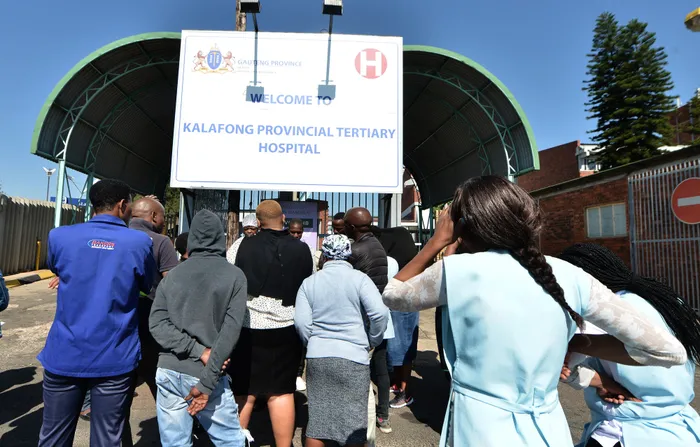Kalafong: A Crisis of Filth, Neglect, and Government Failure
HEALTH CONCERN

As Gauteng Health announces plans to curb hospital-acquired infections, my recent visit to the Kalafong Provincial Hospital was humbling yet stressful, given the conditions under which the medical staff work, says the writer.
Image: File Picture: Bongani Shilubane/African News Agency (ANA)
Despite strained facilities, there are some public hospitals where staff defy the odds to offer a professional, dedicated service.
Against over-crowding, being overworked and poorly maintained hospitals, the professional staff continue to do what they can to attend to patients with various ailments.
As Gauteng Health announces plans to curb hospital-acquired infections, my recent visit to the Kalafong Provincial Hospital was humbling yet stressful, given the conditions under which the medical staff work.
The hospital might be the dirtiest, filthiest, and most unhygienic hospital I have ever visited in my life, but the service I received from capable, professional, and dedicated doctors there spoke volumes.
After a week of feeling unwell, with unbearable fatigue and persistent chest pains, I decided to consult my GP. I couldn't properly articulate what I was feeling, but my doctor suggested X-rays and blood tests, which my medical insurance covered. Two days later, the results came back normal. He then recommended that I see a cardiologist.
I started calling around, only to find that consultations were priced between R5 000 and R8 000, and the earliest appointments were only available in October. While my chest pain persisted, I continued searching for more affordable specialists. One clinic quoted R8 000 for a full check-up, excluding potential treatment costs.
When I contacted my medical insurance, I was told they could only cover R1 300 of the R8 000. I had to humble myself; even with a 10% discount, I couldn’t afford the specialist’s services.
I then visited a local clinic, which referred me to Kalafong Provincial Hospital in Pretoria. I wasn’t prepared to go to a government hospital, but since it had become a matter of life and death, I had no choice.
I arrived around 7 a.m. and, although the receptionist didn’t give much direction, I approached a doctor who was checking the queue. I explained my symptoms and handed over the referral letter from the clinic. She directed me to the emergency queue, noting that chest pain is treated as a serious matter.
After two hours of waiting, I finally saw a doctor. His humility and the way he lightened the moment with a few jokes during the consultation were truly comforting. The nurses who attended to me showed an incredible level of care.
I was taken for an ECG to check my heart’s functionality, and blood samples were drawn to rule out any suspicions. They also recommended I undergo an ultrasound. Despite telling them I could walk, I had driven myself there, after all, they insisted, I remained in a hospital bed as a precaution.
They informed me that I could only be released once my lab results were back. They clearly explained the risks of leaving without knowing what could be wrong. I appreciated their honesty and dedication.
At some point, I asked one of the doctors why the hospital was so filthy. She told me they hadn’t had running water for almost two weeks unthinkable for a tertiary hospital.
To paint a picture: As I entered, I was greeted by a filthy security passage. I brushed it off, thinking maybe it was just because it was outside. I was wrong. When I was asked to provide a urine sample, I was told the toilets inside weren’t working, a fact confirmed by the overpowering stench coming from the bathrooms near the waiting area.
I was directed to the outdoor mobile toilets. The sight and smell were nauseating. I still can’t forget what I saw, but I had no choice. When I was later told I might need to be admitted if the blood results didn’t come through that day, I prayed hard that they would. I couldn’t imagine spending the night in those conditions.
Even though I was just a visitor for the day, I couldn’t stop thinking about the doctors and nurses who work under such conditions every single day. It’s truly inhumane.
After spending 12 hours there, my results came back with no alarming findings. I was told to return to see a specialist and also to get a sonar scan.
The truth is, everything they checked from the X-rays, ultrasound, blood tests, and the recommended sonar are things I wouldn’t have been able to afford privately. This experience showed me just how capable our healthcare practitioners and public resources are when it comes to helping the poor.
I saved myself a whopping R10 000, including the medication I received. But deep down, the thought of having to go back for further check-ups makes me uneasy. I’m not ready to face that grimy environment again, like I did over the past few days.
I fully support ActionSA’s Dr. Kgosi Letlape, who, during the Health Department’s budget vote address, called on all leaders to use public healthcare services.
“All of us should use public services — from the president to MPs, to members of the executive… all public servants. If we do this, we can fix the public healthcare system,” said Dr. Letlape.
I am calling on the City of Tshwane and the National Department of Health to intervene urgently at Kalafong Hospital. With dedicated doctors and nurses doing their best under such conditions, the government must do better. If accountability is needed, then those responsible must be held accountable.
We cannot continue to accept this state of neglect simply because top politicians don’t use public hospitals. Nathi singabantu. We are human too.
Opinion by Zingiswa Mndayi, a Communication Specialist, writing this in her capacity.